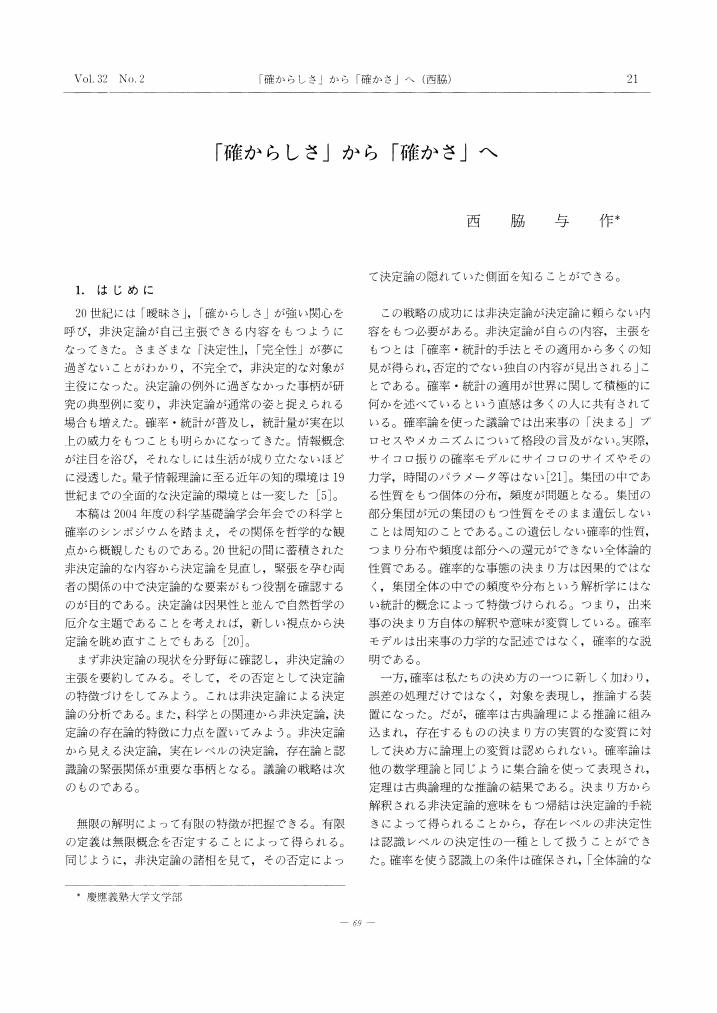9 0 0 0 IR Frege的論理と非Frege的論理
- 著者
- 西脇 与作 藁谷 敏晴
- 出版者
- 慶應義塾大学
- 雑誌
- 哲學 (ISSN:05632099)
- 巻号頁・発行日
- vol.65, pp.23-49, 1977-01
1. logical valueの論理 : 存在論的価値 1.1. 文、真理値、存在の相互関係 1.2. 真理値と2値性 1.3. 結合子としての同一性記号2. W-言語と理論3. SCIの諸性質 3.1. SCIの基本的定理 3.2. 論理評価と指示 3.3. 論理評価の種類4. SCIの拡張 4.1. 中間的諸システム 4.2. 拡張の過程In this paper, " non-Fregean logics " proposed by R. Suszko are studied ; 1. from a philosophical point of view concerning the necessity of introducing the identity-connective, and 2. from technical point of view concerning logical structure of non-Fregean logics. Analysing the Frege's ambiguity in treating the logical constants 1,0 (in Frege), we were led to the conclusion ; 1) A distinction between valuational two valuedness and ontological (referential) two-valuedness should be made, 2) keeping the valuational two-valuedness (the principle of bivalence), the abolition of ontological one is possible (ontological many-valuedness), 3) in order to express logical systems based on valuational two-valuedness and ontological many-valuedness, the introduction of identity-connective is unavoidable. Such logics have been studied among others by R. Suszko as theories of kind W, and its sentential part is called SCI (sentential calculus with identity). In this paper, our interest was directed esp. on 1) logical relations between SCI, SC (sentential calculus) and there intermediate variaties, 2) A possibility of introducing some meta-notions into object languages, 3) some valuations of non-Fregean languages.
4 0 0 0 OA 科学と目的論的な説明
- 著者
- 西脇 与作
- 出版者
- 日本哲学会
- 雑誌
- 哲学 (ISSN:03873358)
- 巻号頁・発行日
- vol.1988, no.38, pp.24-43, 1988-05-01 (Released:2009-07-23)
本研究は、実定法の言語分析を通じて法的知識の論理構造を明らかにするとともに、それに基づいて、実際に即して法的正当化の推論を行なう法律エキスパートシステムの基礎を確立することを目的とする。原理と方法の解明と実証を行なうために、AIワークステーション上に知識ベースと推論機構ならびに最小限のインターフェースからなる実験用のプロトタイプを作成する。三年間の研究において上記の研究目的はほぼ達成された。すなわ、(1)法的知識の構造については、ウィーン売買条件(一部)および民法(一部)の条文を法規範文単位に要件・効果の内的構造において解明するとともに、諸法規範文間の論理的結合関係を明かした。その際とくに法の適用を制御する推論の知識構造を法規範文とその効力を規定しているメタ法規範文の関係として解明した。(2)法律知識ベースとしては、上記分野において、上記原理に基づいて、法規範文とメタ法規範文を複合的述語論理式で表現し、サンプルシステムをAIワークステーションPSI-II上に作成した。(3)法的推論機構としては、a)適用すべき法規範文を決定する推論を、上記法的メタ法規範文を適用した演繹的正当化の推論として構成し、そのための法的メタ推論機構を完成した。また、b)この推論過程を理解・説明するためのユーザフレンドリーな説明機構を作成した。さらに、c)有限なルールを用いて多様な事件に対して法的解決を与えるための拡大解釈や類推適用の工学的モデルを、法的シソ-ラスの構造にしたがった仮説生成の推論として計算機上実装し、その有効性および問題点を検討した。また法的概念辞書の基礎を明らかにした。上記の研究に関連する論理学的、法哲学定、法社会学的、民法学的および情報・知識工学的的基礎付けを行った。本研究によって本格的な法律エキスパートシステムの開発研究の基礎が提供されたと言える。
2 0 0 0 OA 「確からしさ」から「確かさ」へ
- 著者
- 西脇 与作
- 出版者
- 科学基礎論学会
- 雑誌
- 科学基礎論研究 (ISSN:00227668)
- 巻号頁・発行日
- vol.32, no.2, pp.69-78, 2005-03-25 (Released:2009-07-23)
- 参考文献数
- 36
2 0 0 0 OA 意識の自然化
- 著者
- 西脇 与作
- 出版者
- 科学基礎論学会
- 雑誌
- 科学基礎論研究 (ISSN:00227668)
- 巻号頁・発行日
- vol.25, no.1, pp.17-24, 1997-12-25 (Released:2009-07-23)
- 参考文献数
- 23
2 0 0 0 OA 進化生物学と決定論の自然化
- 著者
- 西脇 与作
- 出版者
- 科学基礎論学会
- 雑誌
- 科学基礎論研究 (ISSN:00227668)
- 巻号頁・発行日
- vol.23, no.1, pp.7-13, 1995-12-25 (Released:2009-07-23)
- 参考文献数
- 8
1 0 0 0 OA 進化生物学と形態
- 著者
- 西脇 与作
- 出版者
- ゲーテ自然科学の集い
- 雑誌
- モルフォロギア: ゲーテと自然科学 (ISSN:0286133X)
- 巻号頁・発行日
- vol.2000, no.22, pp.35-47, 2000-10-30 (Released:2010-02-26)
- 参考文献数
- 27
1 0 0 0 OA 新しい総合を求めて
- 著者
- 西脇 与作
- 出版者
- 科学基礎論学会
- 雑誌
- 科学基礎論研究 (ISSN:00227668)
- 巻号頁・発行日
- vol.18, no.4, pp.191-198, 1988-03-25 (Released:2010-01-20)
- 参考文献数
- 28
1 0 0 0 OA 書評
- 著者
- 西脇 与作
- 出版者
- 科学基礎論学会
- 雑誌
- 科学基礎論研究 (ISSN:00227668)
- 巻号頁・発行日
- vol.18, no.2, pp.109-110, 1987-03-25 (Released:2009-07-23)
1 0 0 0 OA 書評
1 0 0 0 OA 生物種の指示について
- 著者
- 西脇 与作
- 出版者
- 科学基礎論学会
- 雑誌
- 科学基礎論研究 (ISSN:00227668)
- 巻号頁・発行日
- vol.15, no.1, pp.15-21, 1980-12-30 (Released:2009-07-23)
- 参考文献数
- 31
1 0 0 0 OA 曖昧さの論理
- 著者
- 西脇 与作
- 出版者
- 科学基礎論学会
- 雑誌
- 科学基礎論研究 (ISSN:00227668)
- 巻号頁・発行日
- vol.13, no.4, pp.151-158, 1978-03-25 (Released:2010-01-22)
- 参考文献数
- 24
1 0 0 0 OA 「性」はどのように考えられてきたか
- 著者
- 西脇 与作
- 出版者
- 日本科学哲学会
- 雑誌
- 科学哲学 (ISSN:02893428)
- 巻号頁・発行日
- vol.34, no.2, pp.25-44, 2001-11-10 (Released:2009-05-29)
- 参考文献数
- 19
The common concept of sex has consisted of many factors, like culture, tradition, scientific fact, and personal experiences and so on. As a result, it includes several prejudices. To explain the true nature of sex, we may have two different types of cause, ultimate and proximate causes, which the variational model of the modern evolutionary theory has and which we cannot find in the usual normal state model. And why-type question is generally answered by using the ultimate causes, and how-type question by using the proximate causes.Using two different types of cause, we explain the development, the structure and the adaptation of sex. In particular, the adaptive explanation of sex, consisting of the explanation of the existence of sex, sexual selection, and the sex ratio, shows not only the mystery of sex but also the emergent meaning of sex.Then we analyze the philosophical meaning of two different types of cause and their relevant problems. Genetic determinism and naturalistic fallacy are interpreted from the ultimate point of view. Lastly the convention, which is introduced as a local law in biology, is clarified naturalistically.
1 0 0 0 OA 拡大された人為選択 進化生物学の視点
- 著者
- 西脇 与作
- 出版者
- 日本科学哲学会
- 雑誌
- 科学哲学 (ISSN:02893428)
- 巻号頁・発行日
- vol.31, no.2, pp.61-74, 1998-11-15 (Released:2009-05-29)
- 参考文献数
- 12
We are now living together with the enormous progress of many biological innovations. In this situation, do these innovations change evolutionary biology? Or can evolutionary biology control these various innovations? There is the strong opinion that we have to change present biology to include the new situation where we can make an artificial selection to change organisms genetically in order to satisfy our desires. I defend evolutionary theory, which should not change itself to treat the new situation, even though it needs a minor change. Within the synthetic theory, we can answer negatively to these two questions. Evolutionary biology took a progress recently and this new population biology claims something positive about the new situation. With new evolutionary ideas we can give partially affirmative answers to these questions. We see why the answers are affirmative by considering evolutionary egoism and altruism. And then we will show that at the bottom of these answers there are many philosophically unsolved problems.
1 0 0 0 OA 遺伝モデルは古典的無知の結果か?
- 著者
- 西脇 与作
- 出版者
- 日本科学哲学会
- 雑誌
- 科学哲学 (ISSN:02893428)
- 巻号頁・発行日
- vol.31, no.2, pp.1-16, 1998-11-15 (Released:2009-05-29)
- 参考文献数
- 19
Let's think first the following argument: if (1) classical mechanics implies Laplacian determinism, and (2) biology is reducible in principle to classical mechanics, then Laplacian determinism holds in biology and therefore, probability used in biology is only the result of classical ignorance. This claim seems to represent the so-called classical attitude toward the probability concept, but still there are many advocates of this position. I will show that this position is wrong by investigating the argument of Laplace's demon. It is shown that probability model can't be reduced to mechanical model, because of having different points of view. We will see the concrete differences between two types of models. From the construction of each model, I will claim that the difference between two types of models is due to the point of view of thinking of the world. Models include many points of view and among them the elements of agents are implicitly included in (genetic) probability models, whereas there are fewer elements in mechanical models than probability models.
1 0 0 0 OA 理論と比喩 そのダイナミズムの一面
- 著者
- 西脇 与作
- 出版者
- 日本科学哲学会
- 雑誌
- 科学哲学 (ISSN:02893428)
- 巻号頁・発行日
- vol.20, pp.73-86, 1987-11-05 (Released:2009-05-29)











